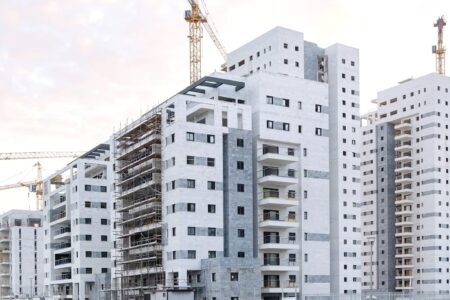The housing price index published by the Central Bureau of Statistics rose by 3.6% between November 2023 and March 2024 after falling by 2.5% in the previous ten months. The average price of an apartment in Israel in the first quarter of 2024 reached 2.23 million shekels, after the market faltered in the first three quarters of 2023.
The number of residential real estate deals executed in the first three quarters of 2023 reached about 6,000 homes per month, which is a low level that we have not seen in at least the past twenty years.
20/80 promotions offered by developers have been discontinued since interest rates started rising and have become almost a market standard (buyers can purchase new apartments under construction for a 20% down payment with the balance paid when the home is completed). The slowdown in the market for new apartments, while at the same time the purchase of used apartments continued to decline. Transaction prices for new apartments have also started to rise. If the average price of a new apartment in the first quarter of 2023 reached 2.07 million shekels, then in the second and third quarters it exceeded 2.1 million shekels.
Since November last year everything has changed. Price indices rose and average transaction prices also rose. It clearly appears that it was not the 80/20 deals that changed this trend, but rather the war.
The war directly contributed to the weight of new apartments purchased currently reaching about 50% of the total market, for the first time since the Covid pandemic in 2020. Then the motivation to buy new apartments was the need to work from home, the additional space required, and the larger and more spacious apartments that That would make it easier to stay at home during long lockdown periods.
During the war, the need for enhanced security rooms in homes increased significantly, and this could only be provided by new and used apartments built in the last 20 years, as the housing built in the 1990s was smaller and did not meet their needs. Security needs.
The quantity of new apartments purchased in the first quarter of this year in the free market jumped by 40%, while in used apartments the quantity purchased in this quarter increased by only 6%. This reflects the demand of apartment buyers to purchase relatively new, used apartments, and the increasing difficulty faced by owners of old apartments in selling them.
When it comes to price indices, there is a significant change between new apartments and used apartments. During the war, the price index for new apartments rose by 1.8%, while the general index (new and used apartments) rose by double. This indicates that the type of apartments that contributed significantly to the rise in prices are used apartments.
Related articles
Developers risk reviving the housing market
Housing deals in Israel show signs of recovery
Since there is no specific index for used apartments, it is only possible to estimate, based on other indicators, that between November 2023 and March 2024, prices for used apartments increased by 5% or more.
This is a very rapid pace, and can be explained by the low supply of used apartments that meet the requirements for safe rooms.
The head of the Israel Builders Association, Raul Srogo, recently told the Knesset Finance Committee that today there is already a delay in the delivery of new apartments of up to six months; The government is unable to formulate effective solutions to bring in foreign workers to ensure that the backlog does not grow in the near future, and those who buy a new apartment will have a better idea of when it will be completed.
Assuming that all of these market conditions do not change in the coming months, the trend we are seeing today is likely to continue and apartment prices, especially relatively new used apartments, will continue to rise rapidly.
Published by Globes, Israel Business News – en.globes.co.il – on June 9, 2024.
© Copyright Globes Publisher Itonut (1983) Ltd., 2024.
